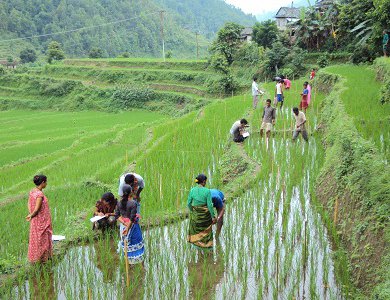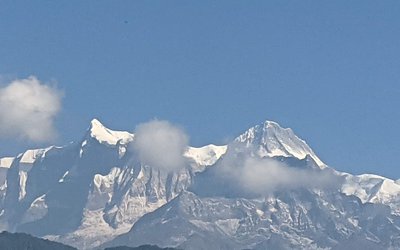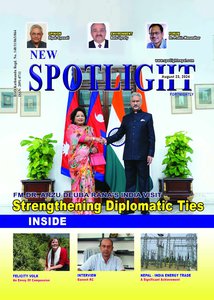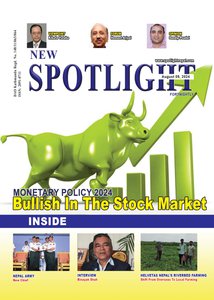
Global perception on economic investment in Nepal is not positive in terms of fundamentals of business-friendly environment.This is disappointing to proud people of Nepal. Enthusiastic private investors are not inspired by the situation despite repetitive political claims of social transformation and progress by governments.Economic stagnation contributes to political stagnation, vulnerability and perception of existential threats. These are mostly linked to political misgivings, misplaced priorities,corruption, poor governance and social injustice.
Economic development should have been the principal concern of all governments, politicians and citizens irrespective of socio-economic affiliation and ideological divides. Result is: majority of population live below margins of subsistence economy and poverty level. Economic vulnerability has gradually deepened with erratic bi-lateral relations with powerful neighbours and the West. This has adversely contributed to business-friendly sentiments and private capital investments from abroad.
During the past decades China and India have advanced economies benefiting from liberalization of global market economy and transformed economies into a higher level of confidence. This trend continues to register with respectable annual growth rates, in real terms, in these two countries.Two neighbours are now significant players in international arena and gradually exerting dominance over economic agenda by expanding political clout and economic muscles at strategic levels. Quite the opposite, Nepal continues to rank near bottom of the scale in doing business and economic prosperity in Global Competition Index is not improving.Nepal was a poor country and presently occupies its rank as the second poorest country in Asia; one notch above war-torn Afghanistan.
Context:
Observers believe China and India will dominate the 21st Century in world economic affairs, primarily due to policy adaptability and flexibility in economic restructuring with global trends,large consumer base market,technology and innovation. With growing economic strengths their political reach will surely extend beyond their national borders.Regional security environment will be continuously redefined in competitive environment when these nations pursue their national interests and military strategies.It is however unthinkable that India and China would want to face each other into another military confrontation at the expense of economic prosperity.
China is leading the way forward and have timely focused on controlled economic reforms,adjusted strategies through infrastructure development under the Silk Road Economic Belt project and, mobilizing domestic consumption,innovation and reorienting manufacturing and trading. By tapping on economic trends unleased by market forces it has succeeded lifting nearly a billion people out of abject poverty.Massive socio-economic transformation is pursued pragmatically, an unprecedented approach in economic history of human civilization. India followed the trend, reluctantly and slowly, but now continues to make leap forward with pragmatism.
What has happened in Nepal is anyone’s guess?Nepal’s economy is incomparable to neighbouring countries for we are too proud to be compared with anyone. That’s the way we are for we are incapable of admitting our catastrophic economic failures. Misleading socio-political messages are hampering to prosperous Nepal. Times have changed because we are terrified of change. This may be for good reason, but political transformation has failed to energize entrepreneurs because economy was not a priority to leadership of Nepal.
Future strategies must include conceptual shifts to creating new avenues of economic opportunities otherwise there is not going to be any promising future.Economic prosperity and national dignity will not come with mere political changes. It calls for policy alignment with pragmatic expectations, capability, experience and timely implementation. There is no short cut to economic development and national prosperity.
We have a political system of patriarchal oligarchy with feudalistic mindset, in general. This is less accommodating to those at the margins of society,minorities and vulnerable groups.Therefore, as a safe bet, political parties disproportionately emphasize patriotism for galvanizing mass emotion. This is devoid of economics. Consequently, Nepal, trapped in vicious circle of political circus and poverty, is likely to remain economically vulnerable and in fragile state.It is astonishing that we could not neither feel or see massive seismic tremors of global economic trends occurring in the neighborhoods. Instead, we succeeded formatting this nation into polarized community in Utopian economic premise infused with political transfusion.
Situation:
Nepal has missed all fast-track trains of liberalization of market economies of the past decades. Global economic scenario is unclear now with no clear emergence of new world economic order.Nonetheless,we must break away from the past euphoria of self-glorification rhetoric and move on with singular goal of economic development.Failing to alter the course, we will be condemned by next generation on our massive failures. We must recognize that economic prosperity is the only effective panacea for most political, social and economic malaise confronting this nation.
Faltering governance is growing into a complex cobweb of communal divides, religious tension, linguistic and geographical biases. This fuels to corruption,social injustice, nepotism,impunity and resource abuse by completely side-lining realistic focus on fixing the malaise. Political manipulations on functioning of state institutions have eroded public confidence in leadership and government.This is providing fertile grounds for political nationalism breeding into populism beyond emotional recovery. This is not positive for social harmony, economic prosperity and national integrity.
As a matter of fact, populism has not developed any country into economic prosperity. It is a lesson from economic history.Political nationalism is a powerful recipe for building walls around us which leads to economic protectionism and isolation. There is no evidence political populism will be positively contributing to economic prosperity differently now and in future.
Political nationalism has rightly struck accord with sentiments of population because it is associated with national glories, emotions and pride.This compartmentalization of national physic is affecting pragmatism and hampering creation of realistic road map for economic resuscitation. In this, governments have failed to establish solid fundamentals of economic base for recovery matching peoples’ aspiration. If it continues like this, it will be detrimental to future security,and economic prosperity is unlikely to emerge for long time to come.
Current government, with two third of parliamentary majority,is falling behind expectation sand appear unable to marshal out development plan for accelerated economic prosperity which, once for all, would unite nation and people on one economic goal. Opportunity exists for redressing past failures.
Where do we go from here?
Sustainable economic opportunities are not created to stem the outflow of millennial. It is because country is in the firm grip of power-monger sand inept leaders who are failing to unite nation as ‘one people,one economic goal under one united nation’. Political landscape, bureaucracy and state institutions are trapped in ‘vicious-circle’ of corruption, political patronage and do-nothing mindset.Country’s progress has become effectively hostage to the system and sustainable economic progress stalled. Corrupt practices are common place and public frustration is on rise. These must be tackled from within political system. But,reform within political parties seem unlikely for legislative and executive branches are benefactors of political patronage where meritocracy, capability and experience are secondary to loyalty.
Bold and radical changes are required to alter the course but only with honest and determined leadership, supported by meritocratic structure. Just take ex-Soviet-Union bloc country Georgia, as an example, on how it succeeded controlling widespread bribery and corruption.Experience of other former communists’ states like Estonia and Poland could also be point of reference.Smaller countries like Uruguay, Chile, Bhutan and Botswana are making better progress.
Beyond economic miracles and natural beauty Switzerland is hailed around the world for its successful direct democracy. This is exemplary. Politics is a vocation for serving nation and people and national duty;not for clinging onto political power forever. Leaders are not lured by financial gains or pompous lifestyle from state’scoffer but are motivated to working passionately with people and community.This could be a tall order for our leaders.
Conclusion:
Leadership transformation is achievable if individuals are endowed with honesty and selfless determination, and passionate about working with people and serving at community level. It must, however,be backed up,in our context, by tough legislation the conduct of members of parliament and bureaucracy so that civic norms are restored to high standards of governance.
Success is generally attributed to unwavering determination, passion and hard work of smart visionary leaders.Creation of corruption-free state is possible if institutions are re-structured and oriented to output and service delivery and led by meritocratic protocol of political elites and bureaucrats. But, our irony is whether one could dream of such scenario at a time when nation's psychic is compartmentalized by political polarization and growing communal divides,and mindset is frozen in times.
Both national dignity and respect come with national wealth and economic prosperity. National wealth is detrimental to economic prosperity and this is the foundation of economic security, sovereignty and dignity. Go no further, just look at China and India on how world view of them have diametrically altered from the past decades? It is a mystery on how one could expect happy Nepali prosperous Nepal without pragmatic and realistic acceleration of economic development?

Kedar Neupane
He can be reached at Neupanek1950@gmail.com
- Talking About South Asian Diaspora Community And Its Economic Prowess In The USA
- Aug 23, 2023
- Talking About Growth Miracle And Emerging Quadripolar Economic Construct (Part – Two)
- Jul 28, 2023
- Talking About Growth Miracle and Emerging Quadripolar Economic Construct (Part – One)
- Jul 02, 2023
- Pseudo-Nationalism Is About Political Desperation And Sure Sign of Economic Collapse Context And Background
- Jun 19, 2023
- Realities In Conflict Of Interest And Challenges Of Combating Corruption In Nepal: PART -TWO
- Jun 08, 2023
















